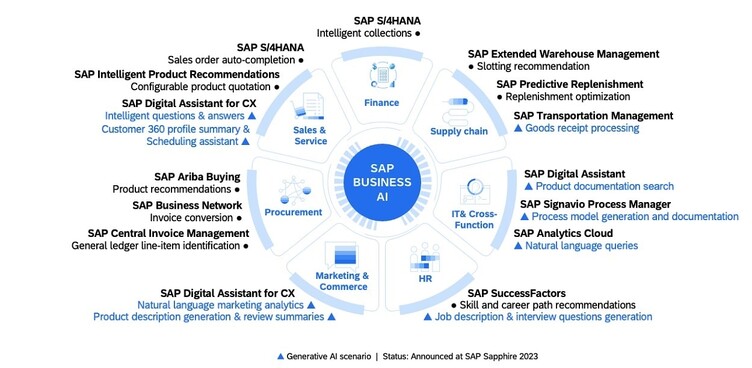This new blog post in our ongoing series about the Digital Solutions Economy™ (DSE) looks at how new developments in Artificial Intelligence (AI) are impacting the ways that companies deploy and manage subscription-based, usage-based, entitlements, ratable, bundled, and other DSE offerings.
Much of the focus over the past year has been on the dramatic rise of generative AI (Gen AI) applications, however other forms of AI such as machine learning have already been in use throughout the earlier evolution of DSE. After the following brief history on these AI applications, we will take a deeper dive into how generative AI is now accelerating new capabilities.

Evolution of AI in Subscription-Based DSE Systems
Before the widespread adoption of generative AI, both B2C and B2B markets have been utilizing various AI and machine learning applications to enhance their subscription-based services and products. Some key examples include:
- Recommendation Systems: Recommender algorithms have been widely used in streaming services (e.g., Netflix, Spotify) to suggest content based on user preferences and viewing/listening habits. This has been a key driver of user engagement and retention. In B2B settings, recommendation systems are also increasingly being used to suggest relevant products, services, or resources to clients.
- Predictive Analytics: Predictive analytics are used to forecast and manage potential future issues such as customer churn. By analyzing historical data and user behavior, companies can identify customers at risk of canceling their subscriptions and take proactive measures to retain them. Predictive analytics also are used to forecast demand, identify market trends, and optimize supply chain management.
- Data Analytics: Data analytics enables companies to gain insights into customer behavior, engagement metrics, and conversion rates, allowing businesses to refine their existing subscription strategies and to use data-driven decision-making for continuous improvement.
- Customer Support and Chatbots: Chatbots and virtual assistants can provide instant customer support, answer frequently asked questions, and troubleshoot common issues, thereby improving customer satisfaction. B2B companies also use chatbots and AI-driven support systems to enhance client interactions, reduce response times, and provide scalable support to their enterprise-level clients.
- Natural Language Processing (NLP): NLP technologies analyze customer feedback, reviews, and social media comments to gain insights into customer sentiments and preferences, enabling companies to make data-driven improvements, gauge customer satisfaction, and identify areas for improvement.
- Fraud Detection and Security: AI and machine learning models are key for fraud detection in subscription-based services, protecting both businesses and customers from unauthorized access and financial losses. Companies also use AI to enhance cybersecurity, protecting sensitive data and ensuring the security of subscription-based platforms.
- Pricing Optimization: AI-driven pricing algorithms enable companies to dynamically adjust subscription prices based on demand, user behavior, and market conditions, thereby maximizing revenue while retaining customers. In addition, B2B companies increasingly use pricing optimization models to tailor subscription packages to the unique needs and budgets of enterprise clients.
How Generative AI and SAP are Changing the Game
Bramasol, as a long-serving SAP partner, has been deeply involved with integrating the above AI and machine learning applications across many client implementations spanning compliance, finance and DSE projects. Now, we're also excited to be on the leading edge of applying SAP's newest initiatives in generative AI to help take our clients to the next level.
The rise of Gen AI, that started in November 2022 with the release of OpenAI's ChatGPT, has opened the door for significantly enhancing the above listed applications while also creating opportunities for holistic new applications that leverage data from across the enterprise to boost customer engagement, surface insights, and increase user productivity.
As mentioned in our earlier blog post on Insights from Sapphire 2023, SAP CEO, Christian Klein, said in his Sapphire keynote, "With generative AI, we will increase the productivity of every end user by changing how people work with our software. For example, our software will be able to answer any business-related question and recommend actions to improve your company's performance."
However, in order to be truly transformative for enterprise applications, Gen AI needs to overcome some of the key limitations and concerns about public-facing implementations like ChatGPT. Two of the most important issues involve the security and timeliness of data used to train the AI models. A third issue is to provide more transparency on sources of data to assure auditability of AI generated results.
As has been widely reported, the current crop of public-facing Gen AI Large Language Models (LLMs) are pre-trained on huge swaths of generic internet data that is typically two years old and has not undergone any rigorous vetting. Also, most of these new Gen AI programs do not cite sources for the answers they provide. These limitations would likely be deal killers for use of Gen AI in most enterprise-level applications, especially in the Digital Solutions Economy where real-time dynamic responses and end-to-end security are critical.
According to Julia White, Executive Board member at SAP, "Like the revolution in cloud technology, the closer AI is to a business’ processes, the more transformative it will be. By harnessing the power of Generative AI in ERP systems, businesses can enhance their operational efficiency, optimize decision-making processes, leverage predictive algorithms, and unlock new possibilities for automation and data analysis."
To create Gen AI solutions that mesh directly with ERP processes, SAP has launched both internal initiatives and major partnering relationships that are intended to overcome the security, timeliness, and transparency issues while also scaling to deliver transformative capabilities.
For example, SAP and Google have announced they will be expanding their partnership in the arena of open data and AI for enterprises that includes an open data offering designed to simplify data landscapes using a combination of both the SAP Datasphere and Business Technology Platform (BTP) in S/4HANA with Google’s data cloud. This enables customers to build an end-to-end data cloud for seamlessly transporting data across the enterprise landscape. SAP also extended the relationship with Microsoft to leverage OpenAI on Microsoft Azure for enhanced service integration between SAP Success Factors and Microsoft Office 365.
As shown below, SAP Business AI is designed to ultimately encompass virtually all aspects of the SAP ecosystem and to address the entire spectrum of ERP, HR, finance and other business arenas.

Summary
It has become clear that generative AI is not a fad or toy but, at the same time, its usage in enterprise scenarios requires significant attention to shoring up end-to-end data security, timeliness of information used by AI models, and transparency on the sources and methods used to generate responses.
From the perspective of Digital Solutions Economy subscription-based applications, once Gen AI is able to overcome these issues, it can produce major benefits by improving content personalization, customer support, recommendation systems, marketing efforts, data analytics, and user experiences in both B2C and B2B industries. This, in turn, will contribute to higher customer retention rates and increased revenue for businesses offering subscription-based services and products, as well as better control over margins, costs, supply chains and business profitability.
For More Information, check out these resources:
- Four Key Insights from SAP Sapphire 2023
- Video: BRIM Quote-to-Cash Overview
- Webinar video: Managing Entitlements in the Digital Solutions Economy
- Webinar video: Power Transition to DSE with SAP Cash and Treasury Management
- Webinar video: Automating Revenue Management for the Digital Solutions Economy
- eBook: Using DSE to Create Integrated, Scalable & Sustainable Business Models

.png?width=3121&name=MicrosoftTeams-image%20(33).png)


